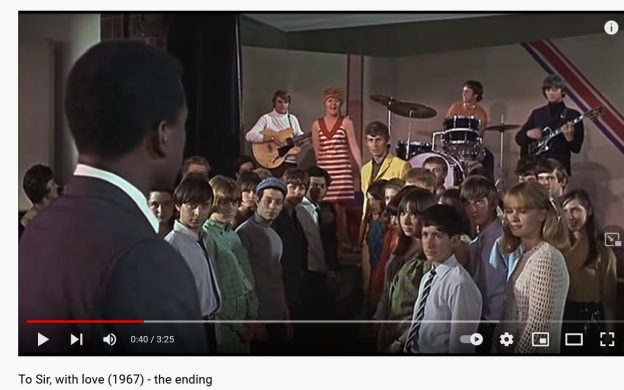British, and so subtle, To Sir, With Love (1967) was my favorite role played by Sidney Poitier, RIP. And what an object lesson it is for America’s disgraceful unionized teachers in the age of COVID.
Mr. Mark Thackeray, “an out-of-work engineer who turns to teaching in London’s tough East End,” loved his students, yet he disciplined them; taught them self-respect, a love of learning, a work ethic and a proportional sense of fun, not the degenerate sense of abandon that now infuses our progressive schools.
“Sir’s” lesson: Never give up on The Kids, but knock ’em into shape.
Teacher was to be addressed as “Sir” because the use of honorifics and proper names, not invented pronouns, is important in an ordered society. It denotes not only a healthy hierarchy and a respect for a figure of authority, but for each other. Thus Pegg is not “Babs” (we have to wonder what such a traditional educator would say of naming a child North, or Londyn, a black name).
After transforming one class into responsible, self-respecting adults ready to face life; Thackeray is offered an engineering job—something better than working with London’s tough, truant East End kids. But following their poignant farewell to him; he is overwhelmed with love for the kids and a sense of his real vocation. He shreds the promotion, realizing the next intake needs him just as much as the first. He has found his calling.
Once there were teachers.
Lulu at her best:



 print
print
They just don’t make ’em like they used to—neither teachers nor their charges. And it’s the rare actor who commands such class and respectability as the likes of Sidney Poitier, Jimmy Stewart, Gregory Peck, and others. But of course that was different human material…
For my favourite entry in the inspirational teacher subgenre I should recommend ‘Goodbye, Mr. Chips’ (1939), which, albeit sentimental by modern tastes, offers a charming portrait of an English boarding school and the lifelong affections which develop between the students and their esteemed teacher.